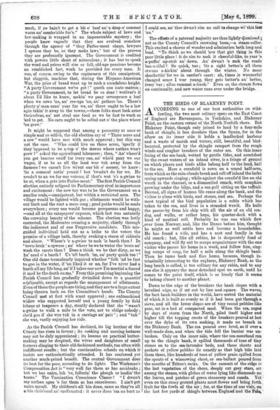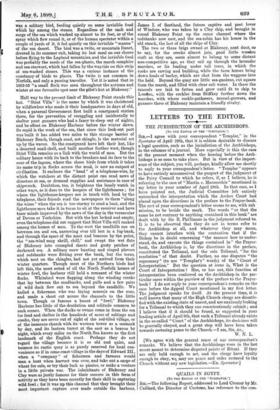THE BIRDS OF Br, AKFNEY POINT. A CC9RDING to one of
our best authorities on wild- fowling, the two most solitary spots on the East Coast of England are Ravenspurn, in Yorkshire and Blakeney Point, 9n the eastern corner of the North Norfolk shore. But Blakeney Point, though only joined to land by a four-mile bank of shingle, is less desolate than the Spurn, for in the elbow on its inner side it holds a landlocked harbour and a waste of marsh and waters, still, beautiful, and bird- haunted, protected by the shingle rampart from the rough winds and rougher breakers of the outer sea. On this inner lining of the sea-bank, wetted by gentle tides, and nourished by the sweet waters of an inland river, is a fringe of ground on which plants and birds alike belong half to the land, half to the sea. Here a cornfield is sown on a sound half-acre, from which as the rain-clouds break and roll off inland the larks spring upwards singing ; while against the cornfield lies an old wreck in the channel, or a dismantled smack, with samphire growing under the bilge, and a sea-gull sitting on the taffmil. Beyond, all signs of human life cease along the bank, and the visitor is alone with birds, and stones, and sea. Perhaps the most typical of the bird population is a robin which has taken to the sea, and lives in a stranded wreck. He hails the passer-by from his ship with all the air of an old sea- dog, and walks, or rather hops, his quarter-deck with a kind of nautical roll. Probably he was one which flew ,over from Norway, and, like the Danes before him, thought he might as well settle here and become a householder. He has found a wife' and has a nest and family in the old smack ; but, like all robins, he is desperately fond of company, and will fly out to scrape acquaintance with the one visitor who passes his home in a week, and follow him, sing- ing scraps of song, for half a mile along the shingle bank. Then he turns back and flies home, because, though in- trinsically interesting to the explorer, Blakeney Bank, as the long beach is called, is too solitary for any robin, and to any one else it appears the most detached spot on earth, until he comes to the point itself, which is so lonely that it seems to belong almost to another planet.
Down to the edge of the breakers the bank slopes with a bevelled edge as if set out by line and square. The waves, the best bank-builders in the world, have sorted the material of which it is built as evenly as if it had been put through a sieve, and all the lower slopes are of tiny round pebbles like peas, set in a bed of compacted sand. When the sea, urged by days of storm from the North, piled itself higher and higher till the topping crests of the breakers poured at last over the dyke of its own making, it made no breach in the Blakeney Bank. The sea poured over level, as if over a well-made dam, and when the tide fell the barrier was us- broken. Only on the inner side, where the sea-moorland ran up to the shingle bank, it spilled thousands of tons of tiny stones on to the sea-lavender beds, and these shoots and pockets of yellow pebbles lie exactly as that high 'tide laid them there, like hundreds of tons of yellow grain spilled from the spouts of a winnowing chest, or sea-ballast poured from the mouths d Triton's sacks. On the summit of the ridge is the last vegetation of the shore, deeply cut grey stars, set among the stones, with globes of water lying like diamonds on the leaves, and patches of green stonecrop and suzeda. Yet even on this stony ground plants must flower and bring forth fruit for the fowls of the air ; for, at the time d our visit, on the last few yards of shingle between England and the Pole, was a solitary bird, feeding quietly on some invisible food which lay among the stones. Regardless of the suck and surge of the sea which washed up almost to its feet, or of the spray which flew round it, or of the human spectator within a couple of yards of it, it fed quietly on this invisible "manna" of the sea desert. The bird was a twite, or mountain linnet, dressed in its summer suit, taking its last meal on our shores before flying to the Lapland mountains, and the invisible food was probably the seeds of the sea-plants, the marsh samphire and sea starwort, which had fallen by the wayside on this strip of sea-washed stones. This was a curious instance of the constancy of birds to places. The twite is not common in Norfolk, and only a passing traveller. Yet it is noted that in 1852-53 "a small flock was seen throughout the autumn and winter at one favourite spot near the pilot's hut at Blakeney."
Half way to the present limit of Blakeney Point stands this hut. "Stint Villa" is the name by which it was christened by wildfowlers who made it their headquarters in days of old, when a paternal Government first built a coastguard station there, for the prevention of smuggling and incidentally to shelter punt gunners who had a fancy to sleep out of nights, and be afloat on Blakeney Harbour before the winter dawn. So rapid is the work of the sea, that since this look-out post was built it has added two miles to this strange barrier of Blakeney Beach, though sand, not shingle, is the material set up by the waves. So the coastguard have left their hut, like a deserted snail-shell and built another further west, though Stint Villa remains as a link with the world of men. But the solitary house with its back to the breakers and its face to the ooze of the lagoon, where the shore birds from which it takes its name trip in flocks across the mud, is now an outpost of civilisation. It encloses the "head" of a telephone-wire, by which the watchers at the distant point can send news of disasters at sea, or demand supplies and assistance in case of shipwreck. Doubtless, too, it brightens the lonely watch in other ways, as it does to the keepers of the lighthouses ; for where the lighthouse-keepers are in touch with land by the telephone, their friends read the newspapers to them "along the wires" when the sea is too stormy to send a boat, and the lighthouse-men take it in turns to sit at the receiver and have their minds improved by the news of the day in the vernacular of Devon or Yorkshire. But with the hut locked and empty, even the telephone did not suggest that Stint Villa still ranked among the homes of men. To the west the sandhills ran on between sea and sea, narrowing ev er till lost in a fog-bank, and through the spars of the mast and beacons by the point, the "sea-wind sang shrill, chill," and swept the wet flats of Blakeney into crumpled sheets and gusty patches of darkened sea. A solitary snow bunting and ringed plovers and red shanks were flitting over the bank, but the terns, which nest on the shingles, had not yet arrived from their winter quarters. Though most of the Northern birds had left this, the most noted of all the North Norfolk homes of winter fowl, the harbour still held a remnant of the winter flocks. Whimbrel were flapping along the winding creeks that lay between the sandbanks, and gulls and a few pairs of wild duck flew out to sea beyond the sandhills. We hailed a fisherman who was laying mussels on the ooze, and made a short cut across the channels to the little town. Though so famous a haunt of "fowl," Blakeney Harbour has little of the desolation and solitude common to such scenes. When the ducks or swans come in from the sea for food and shelter in the hundreds of acres of saltings and creeks, they are never out of sight of the red-tiled village, or of the immense church with its western tower as a seamark by day, and its lantern turret at the east as a beacon by night, which every sailor on the North Sea knows as the first landmark of the English coast. Perhaps they do not regard the village because it is so old and quiet, and because its rustic quay is as purely reserved for local con- venience as if in some coast village in the days of Edward Ill, when a " company " of fishermen and farmers would man a boat when harvest was over, and take out a cargo of wheat for sale, or try their luck as pirates, or make a venture in a little private war. The inhabitants of Blakeney and Cley were as justly famous for their success in this form of activity as they have been recently for their skill in capturing wild fowl ; for it was up this channel that they brought their most important capture ever made outside the harbour, James I. of Scotland, the future captive and poet lover of Windsor, who was taken by a Cley ship, and brought in round Blakeney Point up the outer channel where the redshanks now nest, and the sea-robin has his house in the old smack, the last of all the ships of Cley.
The two or three brigs owned at Blakeney, next door, so to say, for the creeks almost join, good little wooden craft as they are, seem almost to belong to some distant non-competitive age, as they sail up through the lavender marshes, or lie loading under tall trees, in which the rooks are cawing and building, while the farm horses bring down loads of barley, which are shot from the waggons into the hold. Beyond the quay are little sea-gardens, cut square from the marsh, and filled with clear salt water. In these the mussels are laid to fatten and grow until fit to ship to London, with the cockles from Stiffkey further down the marshes, with whose cockle-gatherers, mussel-growers, and gunners those of Blakeney maintain a friendly rivalry.







































 Previous page
Previous page